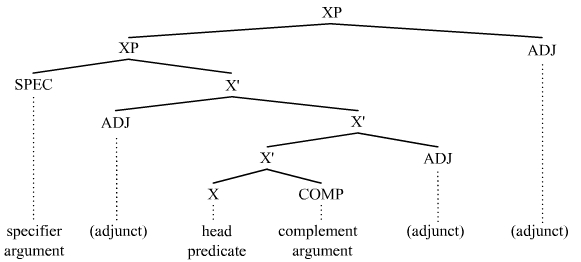|
Adnominal
In linguistics, an adjunct is an optional, or ''structurally dispensable'', part of a sentence, clause, or phrase that, if removed or discarded, will not structurally affect the remainder of the sentence. Example: In the sentence ''John helped Bill in Central Park'', the phrase ''in Central Park'' is an adjunct.See Lyons (1968). A more detailed definition of the adjunct emphasizes its attribute as a modifying form, word, or phrase that depends on another form, word, or phrase, being an element of clause structure with adverbial function. An adjunct is not an argument (nor is it a predicative expression), and an argument is not an adjunct. The argument–adjunct distinction is central in most theories of syntax and semantics. The terminology used to denote arguments and adjuncts can vary depending on the theory at hand. Some dependency grammars, for instance, employ the term ''circonstant'' (instead of ''adjunct''), following Tesnière (1959). The area of grammar that explores th ... [...More Info...] [...Related Items...] OR: [Wikipedia] [Google] [Baidu] |
Noun Phrase
In linguistics, a noun phrase, or nominal (phrase), is a phrase that has a noun or pronoun as its head or performs the same grammatical function as a noun. Noun phrases are very common cross-linguistically, and they may be the most frequently occurring phrase type. Noun phrases often function as verb subjects and objects, as predicative expressions and as the complements of prepositions. Noun phrases can be embedded inside each other; for instance, the noun phrase ''some of his constituents'' contains the shorter noun phrase ''his constituents''. In some more modern theories of grammar, noun phrases with determiners are analyzed as having the determiner as the head of the phrase, see for instance Chomsky (1995) and Hudson (1990). Identification Some examples of noun phrases are underlined in the sentences below. The head noun appears in bold. ::This election-year's politics are annoying for many people. ::Almost every sentence contains at least one noun phrase. ::Current e ... [...More Info...] [...Related Items...] OR: [Wikipedia] [Google] [Baidu] |
Noun Adjunct
In grammar, a noun adjunct, attributive noun, qualifying noun, noun (pre)modifier, or apposite noun is an optional noun that modifies another noun; functioning similarly to an adjective, it is, more specifically, a noun functioning as a pre-modifier in a noun phrase. For example, in the phrase "chicken soup" the noun adjunct "chicken" modifies the noun "soup". It is irrelevant whether the resulting compound noun is spelled in one or two parts. "Field" is a noun adjunct in both "field player" and " fieldhouse". Related concepts ''Adjectival noun'' is a term that was formerly synonymous with noun adjunct but is now usually used to mean "an adjective used as a noun" (i.e. the opposite process, as in ''the Irish'' meaning "Irish people" or ''the poor'' meaning "poor people"). Japanese adjectival nouns are a different concept. English Noun adjuncts were traditionally mostly singular (e.g. "trouser press") except when there were lexical restrictions (e.g. "arms race"), but t ... [...More Info...] [...Related Items...] OR: [Wikipedia] [Google] [Baidu] |
Noun Adjunct
In grammar, a noun adjunct, attributive noun, qualifying noun, noun (pre)modifier, or apposite noun is an optional noun that modifies another noun; functioning similarly to an adjective, it is, more specifically, a noun functioning as a pre-modifier in a noun phrase. For example, in the phrase "chicken soup" the noun adjunct "chicken" modifies the noun "soup". It is irrelevant whether the resulting compound noun is spelled in one or two parts. "Field" is a noun adjunct in both "field player" and " fieldhouse". Related concepts ''Adjectival noun'' is a term that was formerly synonymous with noun adjunct but is now usually used to mean "an adjective used as a noun" (i.e. the opposite process, as in ''the Irish'' meaning "Irish people" or ''the poor'' meaning "poor people"). Japanese adjectival nouns are a different concept. English Noun adjuncts were traditionally mostly singular (e.g. "trouser press") except when there were lexical restrictions (e.g. "arms race"), but t ... [...More Info...] [...Related Items...] OR: [Wikipedia] [Google] [Baidu] |
Constituent (linguistics)
In syntactic analysis, a constituent is a word or a group of words that function as a single unit within a hierarchical structure. The constituent structure of sentences is identified using ''tests for constituents''. These tests apply to a portion of a sentence, and the results provide evidence about the constituent structure of the sentence. Many constituents are phrases. A phrase is a sequence of one or more words (in some theories two or more) built around a head lexical item and working as a unit within a sentence. A word sequence is shown to be a phrase/constituent if it exhibits one or more of the behaviors discussed below. The analysis of constituent structure is associated mainly with phrase structure grammars, although dependency grammars also allow sentence structure to be broken down into constituent parts. Tests for constituents in English Tests for constituents are diagnostics used to identify sentence structure. There are numerous tests for constituents that are ... [...More Info...] [...Related Items...] OR: [Wikipedia] [Google] [Baidu] |
Attributive
{{SIA ...
In grammar, an attributive expression is a word or phrase within a noun phrase that modifies the head noun. It may be an: * attributive adjective * attributive noun * attributive verb or other part of speech, such as an attributive numeral. See also * Property (attribute) * Attribution (other) Attribution may refer to: * Attribution (copyright), concept in copyright law requiring an author to be credited * Attribution (journalism), the identification of the source of reported information * Attribution (law), legal doctrines by which li ... [...More Info...] [...Related Items...] OR: [Wikipedia] [Google] [Baidu] |
Predicative Expression
A predicative expression (or just predicative) is part of a clause predicate, and is an expression that typically follows a copula (or linking verb), e.g. ''be'', ''seem'', ''appear'', or that appears as a second complement of a certain type of verb, e.g. ''call'', ''make'', ''name'', etc. The most frequently acknowledged types of predicative expressions are predicative adjectives (also ''predicate adjectives'') and predicative nominals (also ''predicate nominals''). The main trait of all predicative expressions is that they serve to express a property that is assigned to a "subject", whereby this subject is usually the clause subject, but at times it can be the clause object. A primary distinction is drawn between predicative (also ''predicate'') and attributive expressions. Further, predicative expressions are typically ''not'' clause arguments, and they are also typically ''not'' clause adjuncts. There is hence a three-way distinction between predicative expressions, argum ... [...More Info...] [...Related Items...] OR: [Wikipedia] [Google] [Baidu] |
Disjunct (linguistics)
In linguistics, a disjunct is a type of adverbial adjunct that expresses information that is not considered essential to the sentence it appears in, but which is considered to be the speaker's or writer's attitude towards, or descriptive statement of, the propositional content of the sentence, "expressing, for example, the speaker's degree of truthfulness or his manner of speaking." A specific type of disjunct is the ' (or sentence adverbial), which modifies a sentence, or a clause within a sentence, to convey the mood, attitude or sentiments of the speaker, rather than an adverb modifying a verb, an adjective or another adverb within a sentence. More generally, the term ''disjunct'' can be used to refer to any sentence element that is not fully integrated into the clausal structure of the sentence. Such elements usually appear peripherally (at the beginning or end of the sentence) and are set off from the rest of the sentence by a comma (in writing) and a pause (in speech). ... [...More Info...] [...Related Items...] OR: [Wikipedia] [Google] [Baidu] |
Conjunct
{{For, the linguistic and logical operation of conjunction, Logical conjunction In linguistics, the term conjunct has three distinct uses: *A conjunct is an adverbial that adds information to the sentence that is not considered part of the propositional content (or at least not essential) but which connects the sentence with previous parts of the discourse. Rare as it may be, conjuncts may also connect to the following parts of the discourse. **''It was raining. Therefore, we didn’t go swimming.'' **''It was sunny. However, we stayed inside.'' **''You are such a dork. Still, I love you from the bottom of my heart.'' *A conjunct is one of the terms that are conjoined in a conjoining construction. Conjuncts are conjoined by means of a conjunction, which can be coordinating, subordinating or correlative. Conjuncts can be words, phrases, clauses, or full sentences. ** ''Gretchen and her daughterbought ''motor oil, spark plugs, and dynamite **Take two of these and call me in the m ... [...More Info...] [...Related Items...] OR: [Wikipedia] [Google] [Baidu] |
Argument (linguistics)
In linguistics, an argument is an expression that helps complete the meaning of a predicate, the latter referring in this context to a main verb and its auxiliaries. In this regard, the '' complement'' is a closely related concept. Most predicates take one, two, or three arguments. A predicate and its arguments form a ''predicate-argument structure''. The discussion of predicates and arguments is associated most with (content) verbs and noun phrases (NPs), although other syntactic categories can also be construed as predicates and as arguments. Arguments must be distinguished from adjuncts. While a predicate needs its arguments to complete its meaning, the adjuncts that appear with a predicate are optional; they are not necessary to complete the meaning of the predicate. Most theories of syntax and semantics acknowledge arguments and adjuncts, although the terminology varies, and the distinction is generally believed to exist in all languages. Dependency grammars sometimes call arg ... [...More Info...] [...Related Items...] OR: [Wikipedia] [Google] [Baidu] |
Adverbial
In English grammar, an adverbial ( abbreviated ) is a word (an adverb) or a group of words (an adverbial clause or adverbial phrase) that modifies or more closely defines the sentence or the verb. (The word ''adverbial'' itself is also used as an adjective, meaning "having the same function as an adverb".) Look at the examples below: :''Danny speaks fluently.'' (telling more about the verb) :''Lorna ate breakfast yesterday morning''. (telling when the verb's action occurred) The form of adverbials Adverbials most commonly take the form of adverbs, adverb phrases, temporal noun phrases or prepositional phrases. Many types of adverbials (for instance: reason and condition) are often expressed by clauses. :''James answered immediately''. (adverb) :''James answered in English.'' (prepositional phrase) :''James answered this morning.'' (noun phrase) :''James answered in English because he had a foreign visitor''. (adverbial clause) An adverbial is a construction which modifies or de ... [...More Info...] [...Related Items...] OR: [Wikipedia] [Google] [Baidu] |




